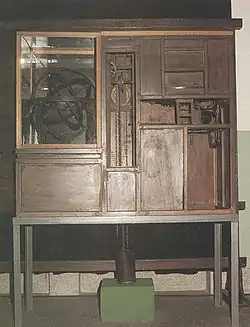Song I-yeong | |
|---|---|
| Born | 1619 |
| Died | 1692 or before 1687[1] |
| Spouse | Lady Jo (趙氏[1]) |
| Children | Song Gyeong-sim (宋慶心[1]) Song Gyeong-yun (宋慶胤[1]) Song Gyeong-yeom (宋慶濂[1]) |
| Parents | |
Song I-yeong (Korean: 송이영; Hanja: 宋以潁[2]; MR: Song I-yǒng, 1619–?) was a Korean court astronomer of the Joseon dynasty. He invented a weight-powered astronomical clock (possibly the Honcheonsigye) and contributed greatly to the implementation of the Shixian Calendar (from Qing China) in Joseon. He also made systematic observations of two comets.[1]
Armillary clock

In 1659, during the reign of King Hyeonjong, Song I-yeong made an astronomical clock by combining an armillary sphere, long used in East Asia, with the western alarm clock. The result was a device that could both trace the movements of the sun and the moon, as well as display and announce the time. [3]
The clock was repaired in 1687–1688, after which it disappeared from historical records. In the 1930s, Kim Seong-su purchased the honcheonsigye, which is still housed at Korea University.[3] The historian of science Jeon Sang-woon (전상운, 全相運), who examined the device in 1962, assumed that it was Song I-yeong's device, and the British historian of science Joseph Needham adopted this view.[4] However, Gari Ledyard[5] and O Sang-hak (오상학) have separately argued that the object dates from much later.[6]
References
- 1 2 3 4 5 6 7 8 Sang Hyuk Kim (김상혁); Byeong-hee Mihn (민병희); Yoon-kyung Seo (서윤경); Yong Sam Lee (이용삼) (2018). "송이영(宋以頴)의 생애와 천문업적" [Life and Astronomical Contribution of Song, I-yeong] (PDF). Publications of the Korean Astronomical Society (in Korean) (33): 31–44. Retrieved 18 July 2021.
- ↑ Yu Gyeongro (유경로) (1996). "송이영(宋以潁)". Encyclopedia of Korean Culture (in Korean). Retrieved 18 July 2021.
- 1 2 Kim, Sang Hyuk; Lee, Yong Sam (2015). "Song I-Yeong's Armillary Clock" (PDF). In Ruggles, Clive L.N. (ed.). Handbook of Archaeoastronomy and Ethnoastronomy. Springer. pp. 2179–2195. doi:10.1007/978-1-4614-6141-8_249. ISBN 978-1-4614-6140-1. Retrieved 18 July 2021.
- ↑ Needham, Joseph (1986). The Hall of Heavenly Records: Korean astronomical instruments and clocks, 1380-1780. Cambridge: Cambridge University Press. p. 110-151.
- ↑ Ledyard, Gary (1994). "Cartography in Korea". In Hartley, J.B.; Woodward, David (eds.). The History of Cartography, Vol.2, book 2: Cartography in the Traditional East and Southeast Asian Societies. Chicago: University of Chicago Press. p. 249-253.
- ↑ O, Sanghag (2011). Joseon Sidae Segye Jido Wa Segye Insig 조선 시대 세계 지도 와 세계 인식 (Joseon World Maps and Knowledge of the World). Paju 파주: Changbi 창비. p. 193-202.